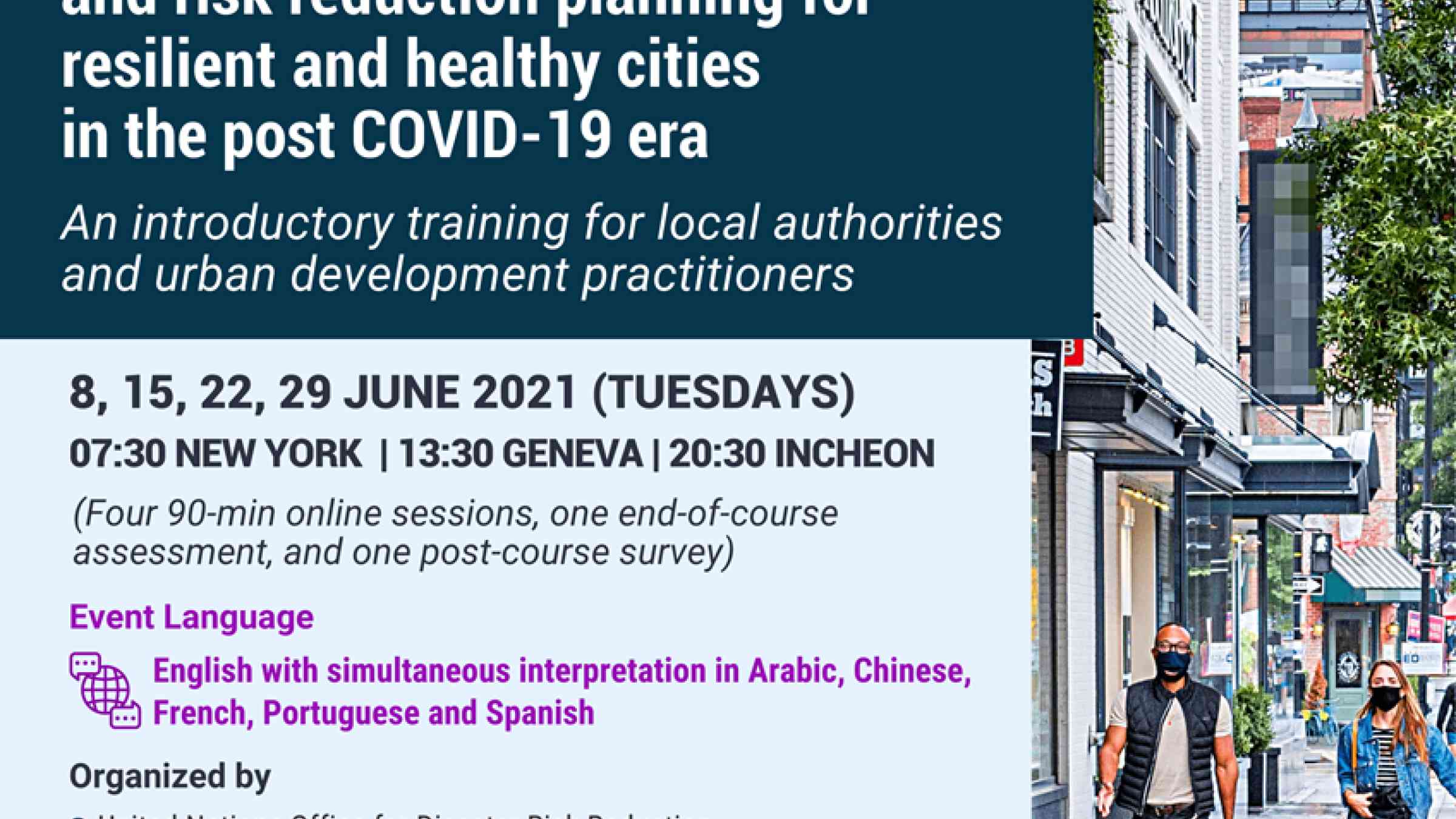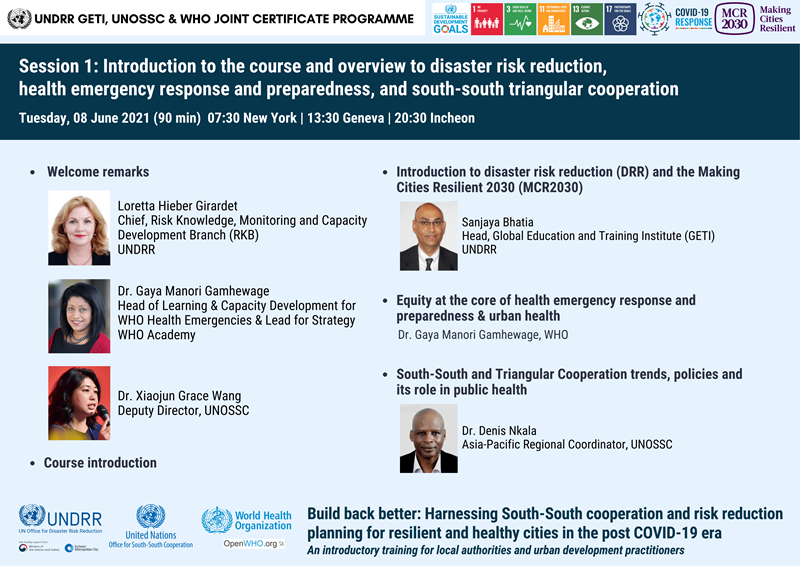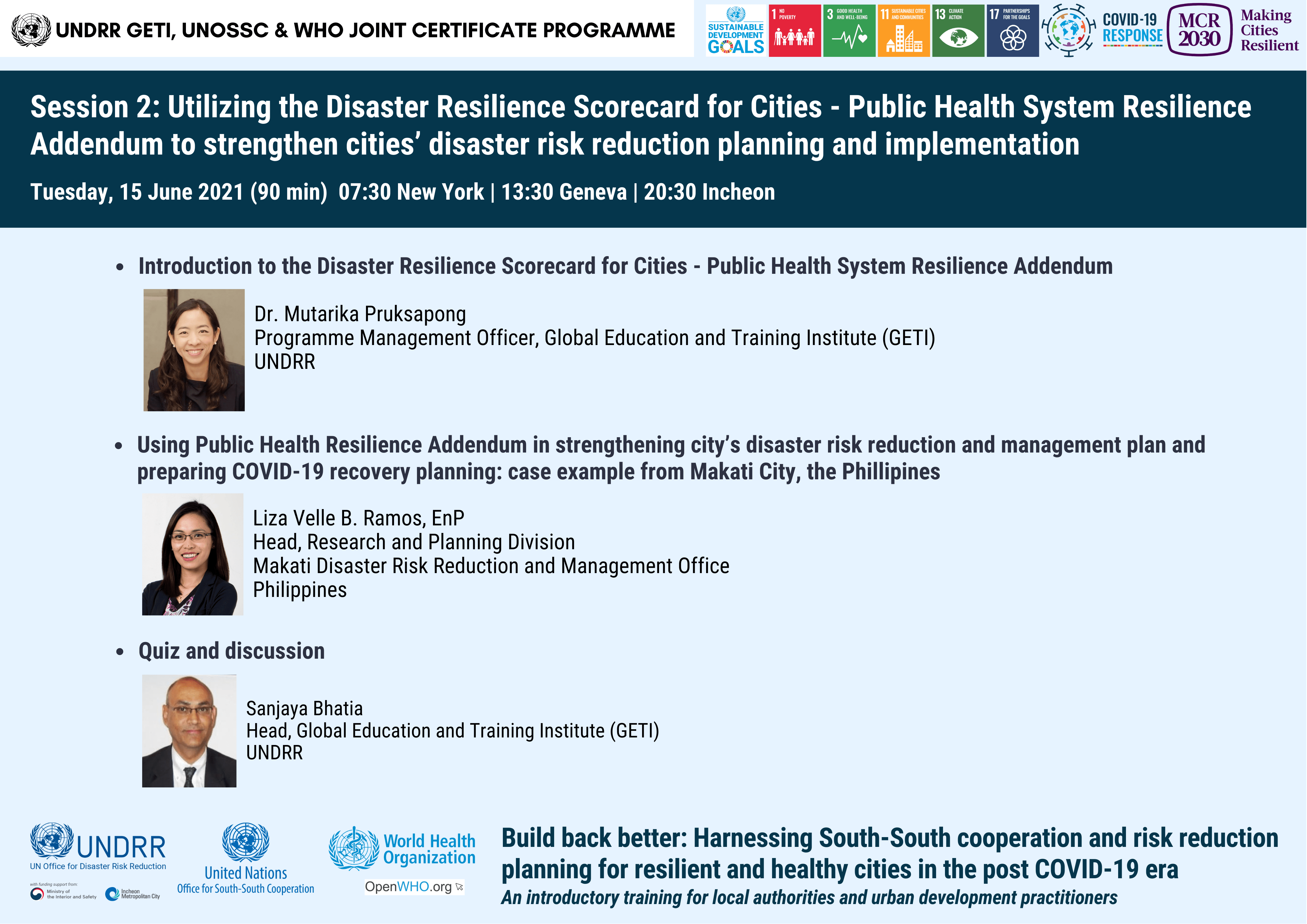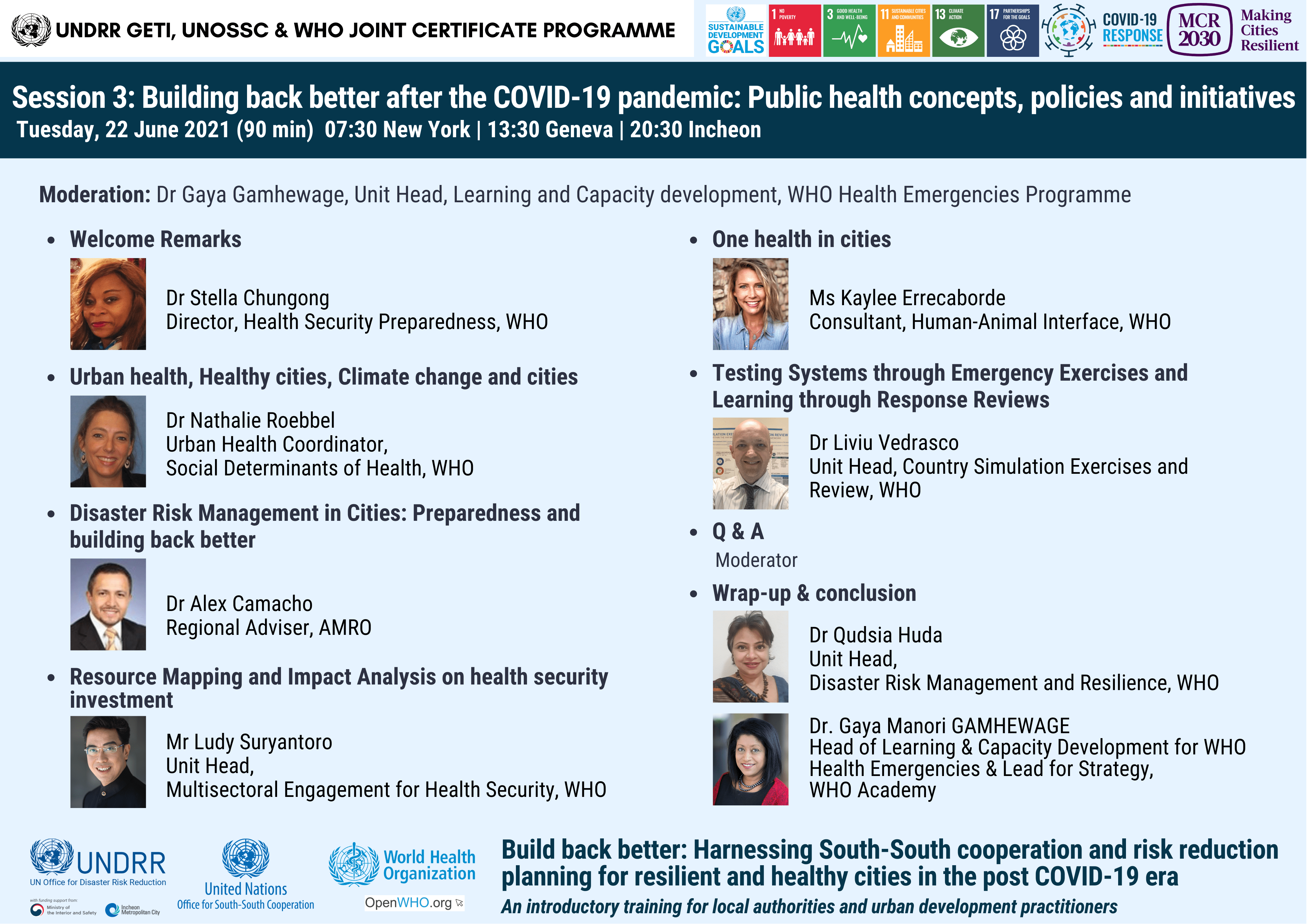[UNDRR GETI, UNOSSC & WHO Joint Online Training] Build back better: Harnessing South-South cooperation and risk reduction planning for resilient and healthy cities in the post COVID-19 era

- English
Date and Time
8 – 29 June 2021 (Tuesdays, 4 weeks)
7:30 am (New York) and 8:30 pm (Incheon)
4 online sessions (90 min), 1 end-of-course assessment, and 1 post-course survey.
Workshop Language
English, with simultaneous interpretation in Arabic, Chinese, French, Portuguese and Spanish.
Course Background
Cities and their residents are at the epicentre of the COVID-19 pandemic. More than half of humanity live in urban settings. Conditions in cities have fanned the pandemic and the pandemic has deeply impacted cities.
The link between healthy populations and healthy economies could not be more obvious. The pandemic is expected to lead to 15 to 25 percent less revenue of municipal authorities around the world in 2021. This is expected to reach a staggering 30 to 65 percent in African cities. Cities are also suffering from the devastating impact of lockdown measures on informal economies, the lifeblood of many urban areas in developing countries, compounded with inadequate safety nets to soften the blow for the workers. Moreover, cities coping with economic shocks, aging infrastructure, and declining populations and cities relying on tourism, hospitality, transport, or logistics, are particularly affected. Like in any human setting, existing socio-economic inequities in cities have surfaced and further fanned the flames of the pandemic. The poorest, most excluded city dwellers have been the hardest hit.
City leadership is crucial to reopening the world. Local governments and communities played a critical role in the COVID-19 response. With much riding on cities, the leadership and capacity of municipal governments will largely decide the quality of recovery and response. Building back resilient cities will hinge not only on reactivating or opening the economy, but also on ensuring that the underlying weaknesses that allowed COVID-19 to thrive are addressed to prevent the next pandemic. Chief amongst them are underfunded health systems and inequity in access to services. Health and preparedness must not be seen by cities and their citizens as a costly burden, but rather as a vital investment that ensure resilience and prosperity, Equally important is the mutual learning and support among cities across countries with their tested and innovative experiences. Policy makers are increasingly concerned with how best to strengthen municipal governments’ capacities in disaster and risk reduction, public health emergency response, as well as their abilities to collaborate and learn from each other’s experiences.
The Buenos Aires outcome document of the second High-level United Nations Conference on South-South Cooperation (BAPA+40) in 2019, recognized that South-South and triangular cooperation, takes different forms, such as knowledge sharing, training and capacity building, and technology exchange on mutually agreed terms in different important areas for sustainable development, such as disaster risk mitigation and climate change among developing countries. It also recognized that the local authorities play a growingly indispensable role in South-South and triangular cooperation for achieving sustainable development.
Equipping cities with knowledge and capability to manage complexity of risks is crucial. Cities can no longer work in silo or focusing only on certain type of hazards. Instead, cities must be able to deal with the complexity of risks and able to managing multiple risks arising from natural to manmade hazards, including the pandemics. COVID-19 is a clear illustration of how a hazard can cause multi-fold impact on various sectors within and across the cities, from health department to emergency response management, transportation, tourism, education, commercial sector and beyond. Risk is systematic. Taking a systems approach, breaking the silos and fostering multi-sectoral and multi-stakeholder engagement in disaster risk reduction are key elements to making cities resilient, safe and sustainable.
The Sendai Framework for Disaster Risk Reduction 2015-2030 highlights the importance of reducing risks and building resilience at the local and sub-national level. Moving towards 2030, in the decade of action, cities must have the evidence-based strategies in place to guide implementation to risk reduction efforts. While cities are currently responding to the pandemic, cities also need to prepare for post COVID-19. Revisiting the local disaster risk reduction strategies and ensuring strengthened coordination, systematic cooperation and integrating risk of biological hazards and overall disaster risk management approach are the crucial.
Course Objective
This training serves as an introductory training for urban leaders, planners and practitioners, aiming to:
- Increase the understanding and capacities in disaster and risk reduction, for effective and equitable public health emergency response, and South-South cooperation.
- Better prepare stakeholders for re-opening cities following the COVID-19 pandemic and better prepare for future crises - especially health emergencies;
- Facilitate city-to-city partnerships in South-South and triangular cooperation (SSTC) towards sustainable development.
By the end of this training, participants shall be able to:
- Describe and understand disaster risk reduction, public health emergency response and South-South and triangular cooperation;
- Explain SSTC trends and policies in disaster risk reduction, Sendai framework and other disaster risk reduction frameworks, public health responses at urban levels.
- Provide examples of cities’ COVID-19 responses, share relevant solutions on DRR and health emergency responses, and exchange cities’ SSTC experiences and good practices on DRR and health emergency responses;
- Use tools related to disaster risk reduction planning, public health response and SSTC.
Expected Outcomes
- National and local government officials as well as urban resilience practitioners with enhanced knowledge on the requirements for fostering resilient Cities in the post COVID-19 era.
- Increased understanding of South-South and triangular cooperation trends and policies and its importance in disaster risk reduction and public health emergency response; disaster risk reduction (DRR) normative frameworks, such as the Sendai Framework for DRR, the Making Cities Resilient 2030 initiative; and tools to help strengthen disaster risk reduction and public health resilience planning such as the Disaster Resilience Scorecard for Cities – Public Health System Resilience Addendum;
- Increased awareness of cities’ experience and solutions on COVID-19 responses, public health emergency responses, inequity reduction strategies, disaster risk reduction strategic planning, sustainable urban development showcases, exchanges, and captured in a knowledge report for further dissemination and public policymaking;
- Partnership brokering between cities as well as city-related entities facilitated and documented for the incubation of thematic communities of practice (CoP), city clusters, and city networks.
Targeted Audience
Local and national government officials in charge of disaster risk reduction and management, urban development and planning, public health; emergency preparedness, national associations of municipalities; urban resilience and development practitioners as well as civil society, private sector, and academia.
The course is open to all applicants from both developed and developing countries, especially the young experts and officials. Participants from Least Developed Countries (LDC) and Small Island Developing countries are highly encouraged.
Training Agenda
| Week 1 | 08 Jun 2021 (90 min) |
Welcome & Introduction
|
| Week 2 | 15 Jun 2021 (90 min) |
Utilizing the Disaster Resilience Scorecard for Cities - Public Health System Resilience Addendum to strengthen cities’ disaster risk reduction planning and implementation
|
| Week 3 | 22 Jun 2021 (90 min) |
Building back better after the COVID-19 pandemic: Public health concepts, policies and initiatives
|
| Week 4 | 29 Jun 2021 (90 min) | UNOSSC led South-South cities exchanges on “Cities innovative experiences on reopening and adjusting disaster risk reduction and public health measures in response to COVID-19 and preparing for the future.” |
| End-of-course assessment (Exam) |
Participants must complete an online assessment via OpenWHO’s online test platform in the end of the course. The link will be given to only eligible participants i.e. those who attended 75% of the live sessions and completed the feedback survey at least once. |
|
Course assessment (exam)
Participants will be given an online voluntary end-of-course assessment to test their understanding and knowledge taught and presented in the webinar. The assessment will consist of a quiz to test the knowledge on South-South and triangular cooperation, disaster and risk reduction, and public health. To be considered successful, the participants need to succeed the completion of the quiz at a rate of 80%.
Course evaluation
To enable evidence-based course evaluation, a post-course survey will be disseminated to participants to collect feedback on the course contents and organization, as well as understanding participants’ development needs for follow-up and to facilitate future programmatic designing.
Certificate
Certificate of completion will be given to participants who attend at least 3 live sessions (75%), complete a feedback survey and an end-of-course assessment (80% success).
Organizers
- United Nations Office for Disaster Risk Reduction (UNDRR) Global Education and Training Institute (GETI)
- United Nations Office for South-South Cooperation (UNOSSC)
- World Health Organization (WHO) Health Emergencies Programme
For more information:
UNDRR Global Education and Training Institute (GETI) at [email protected]
UNOSSC at [email protected]
WHO at [email protected]


